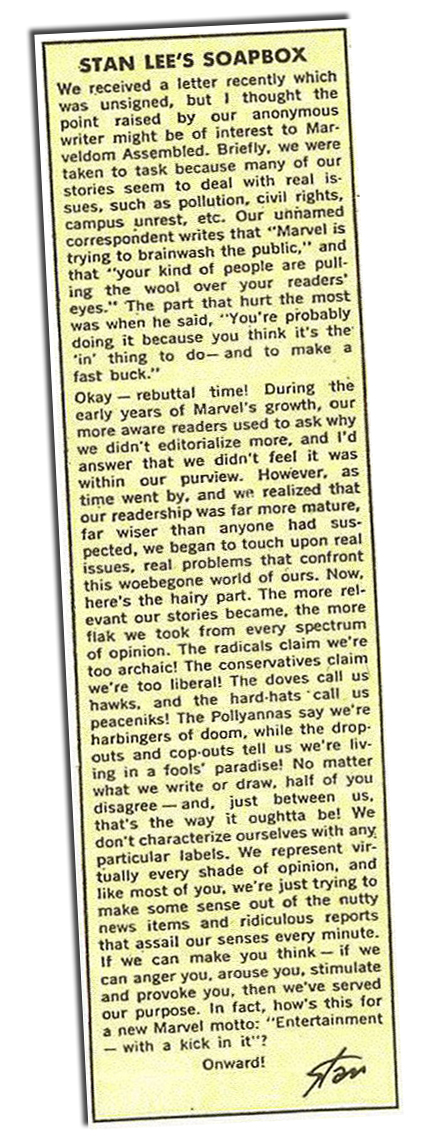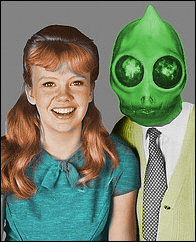 Back before Stan's Soapbox was filled with content that resembled the script from a used car salesman's television commercial, The Man sometimes had something important to say.
Back before Stan's Soapbox was filled with content that resembled the script from a used car salesman's television commercial, The Man sometimes had something important to say.
This editorial from Spider-Man #96 (May 1971) has (allegedly) Stan Lee bemoaning that Marvel can't please everyone all the time. While his rebuttal has a point I do find exception that he asserts that Marvel did not editorialize as much as some claimed they did.
Nearly every issue of early Marvel featured the hero battling Communism in some form or another. Often the villains were either direct assaults by Russia or "Red agents" were sabotaging the defense effort. While it may be a stretch of the imagination to extend the commie agenda to the alien races the heroes defended the earth against, many of them were from conformist races where the over-all goal of conquest sublimated the rights, desires and identities of the individuals.
The alien Skrull were of course the most obvious allegory to Communism. Spouting memorized rhetoric by rote the Skrull could change their shape and hide among the peoples of America, a secret army that would strike when the nation was at it's most vulnerable. Ironically, in their first appearance in Fantastic Four #2 (January 1962) they were defeated by clever American propaganda.
Every good comic book story needs a villain and since Mom and Dad controlled the money with a totalitarian iron fist the content of the comics had to be palatable. Mom knew that Dad wouldn't mind Junior reading a comic book if it featured those Dirty Reds getting a good what for.
The 1970's were a good time for comics as far as the writing goes. Stan, a man politically from another generation, must have been mystified by the new guys and gals in the industry then, but that didn't mean he didn't know what they could do for the cash flow. While they were definitely professionals, they also clearly had a bias that would be called liberal today. Much of the stories had an underlying theme of The Little Guy vs Big Evil Business/Government and were usually very pro-environment and anti-exploitation. The villains were often some lone inventor screwed by a giant, heartless industrial machine. Even Tony Stark changed from being the Merchant Exporter of Death to Peacenik, building homes for the poor as began manufacturing printed circuits in favor of bullets.
These themes attracted a certain demographic very nicely and Marvel swiftly trounced the more status quo-oriented DC in sales. This lasted until the early 80's and the advent of Reaganism, when it became cool to once more exploit people, rape the land and drain resources with no thought to the consequences or a plan for prudent management. The only holdover of the last decades' activism in comics was in the form of the reboot Lex Luthor, an evil tycoon that people loved to hate for his use and abuse of people and the environment. Mother Nature eventually fought back though and Lex Luthor "died" after he contracted radiation poisoning from a piece of a very world he sought to exploit.
While some people downplay the effect of comic book activism has had on people I feel that it is not as minuscule a force as has been asserted. Like many things, comic books would be only a small part of a person's life education. My childhood was shaped by many different experiences. Parents, daily adventures and of course books and television to some degree. I saw graphic scenes from Vietnam on the news and I read comics that in some clumsy way denounced war and our involvement (Newer fans of comics may recall the Anti-Drug and Anti-Apartheid titles featuring the characters from the Teen Titans). Comic books did not shape me into who I am today but they were a small part of the overall growth of a person. Comic books are a part of an accumulative experience, which may be what concerned the Wertham crowd in the previous decades.
So Stan Lee, in a period of widespread activism in comics made a plea to readers to just enjoy the product as they are just trying their best. The comics Marvel produced at the time were attempting to be topical and greatly appealed to their market audience of college students and young adults with disposable income. Publishers were slowly and carefully edging away from the constraints of the Comic Code Authority and pushing the envelope with their content (This backfired in the late 1980's and early 1990's as comics appealed to the wrong demographic by catering to the horny fanboy and quality and the industry suffered as a result). The issue of Spider-Man that Stan's editorial appeared in was published, without fanfare of any kind, without the CCA seal of approval. It is also possible the company may have been coming to the attention of certain groups or under attack by organized campaigns disguised as honest concerns or opinions from individuals, a tactic that is very common now as special interest groups hijack a process meant for a legitimate voice.
Tags: Marvel Comics Activism Stan+Lee
Wednesday, November 29, 2006
Stan Lee says: STFU, True Believers!
Posted by
Sleestak
at
11/29/2006 05:05:00 AM
![]()
![]()
Subscribe to:
Post Comments (Atom)



























I don't think comics in general are any worse than something like "Law and Order" with every episode "ripped from the headlines."
ReplyDelete"STFU, True Believers!"
ReplyDeleteAwesome, Retro.
ReplyDeleteI'm totally stealing that and changing the title.
Folks who try to write from a "neutral" perspective, no matter how good their intentions, are doomed to mediocrity and they gyp their readers. Struggling to keep your editorial agenda out of your comics just pushes the agenda into the realm of subtext...where you have LESS control over it and it becomes almost impossible to reign in. Better to write with your heart on your sleeve, where your conscience can keep an eye on it. Also, never resist the urge to mix metaphors.
ReplyDelete